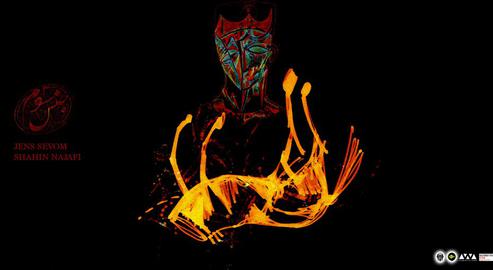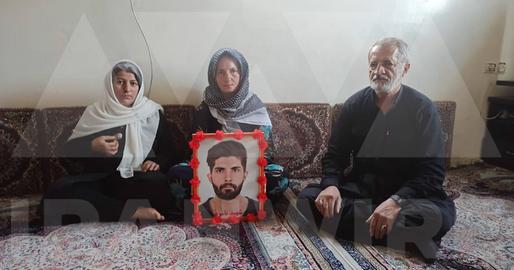The album The Third Gender (“Jens-e Sevom”), the ninth work by Shahin Najafi, was published by IranWire on January 17. Among the 10 songs on the album, one is a reworking of a poem by the celebrated Iranian poet Esmail Khoi and one is an adaptation of a folk song. The lyrics of the other eight are poems by Najafi himself.
The Third Gender is a blend of folk melodies and contemporary influences, and heralds a revolutionary new direction for Najafi’s music.
“The album is the product of certain ideas about folk music and my work on jazz over the past two years,” Najafi tells IranWire. “The album is neither exclusively folk music nor solely jazz. I think it should be called ‘contemporary music’.
“It could also be called ‘chamber music’ because of the structure of the ensemble, whereby four instruments are played next to each other. This kind of performance is generally not for orchestras and large halls, but for smaller spaces in a cozier environment.”
On the album, Najafi is accompanied by Pouya Mahmoudi, Habib Meftah and Adrian Wachowiak: four artists who come from different worlds.
The guitarist and singer Pouya Mahmoudi is known for his fusion of Iranian music and rock. He is one of the most important Iranian modern musicians: a teacher, a virtuoso, and a composer with a critical mind.
The percussionist Habib Meftah is an international musician with intimate knowledge of folk music, particularly the music of southern Iran. He has infused The Third Gender with his creative ideas.
The master pianist Adrian Wachowiak has been similarly influential in the development of the album, and brought a German touch to the work.
“I wrote and directed this collection, but all four of us were central to its creation,” says Najafi. “We were four separate islands, but we connected through our ideas.”
Finding Common Ground
In an interview with IranWire, Mahmoudi speaks about his musical contribution to The Third Gender.
“I have played for a number of albums,” he says. “In The Third Gender, Mr. Najafi directed all 10 pieces and, as the author, he had the final say. We talked for hours and found we had a lot of shared ideas about folk music.
“Finding this common ground was very appealing to me. In the end we decided that my experience playing and studying Iranian folk music could be useful for this album.”
Mahmoudi, 44, believes that Najafi has “properly and appropriately” used elements of folk music in The Third Gender. “He wishes to return to the roots of his native culture and is not afraid of getting close to this culture. In this way, he is not simply reacting to cultural nostalgia.”
He adds: “This way of ‘returning’ is actually more of a ‘going forward’ than satisfying nostalgia in order to sell. Listening to this album and relating to it is not easy for the audience. The listener must have specific cultural sensitivities and feel a different kind of nostalgia.
“The listener must defamiliarize his nostalgia to grasp the novelty of this work.”
The relationship between form and content has been one of Najafi’s most important musical preoccupations for a decade. The Third Gender is the culmination of this lengthy period of thought and experimentation.
“In this album, content and form are so integrated that sometimes the listener will have difficulty understanding it,” says Mahmoudi. “In this kind of Iranian music, the poem has historically been at the center, but in The Third Gender the story is different. In this work, the poem and the music are equally central and both have the same weight.
“The symbols and patterns in this work may make it difficult to understand for an Iranian listener who is under the influence of the West and is used to the consumerist models of fusion music.”
A New Kind of Nostalgia
Mahmoudi believes Nooshoo Ray is the “musical masterstroke” of the album, though he himself does not feature in this song.
“Its musical underpinning is very modern,” he says. “It is different in content and form to other works by Najafi – and to me it is perfect.
“I am so happy to work on an album where the musician has succeeded both in getting very close to his cultural roots and in articulating a modern style that is not reduced only to orchestration from the point of view of harmony and musicality.”
He continues: “We can proudly and seriously say that the musical coherence in form and content achieved on this album is without precedent.
“Some might say it is fusion music, but it is not. There are many whose definition of fusion music is wrong. Sometimes they even have its history wrong. You do not get fusion music by putting together a few Eastern and Western musical instruments.
“Before 1979, there were certain experiments in the use of native cultural themes in Iranian music. Kourosh Yaghmaei, for example, used Iranian folk music in his works. But you cannot call his work fusion music, even though it had all the required elements.
“Later on, anybody who would put a few Western and Eastern instruments together, even without any understanding of the original native music, was called a fusion musician or singer.”
According to Mahmoudi, the use of cultural motifs has been ongoing throughout the history of music. “Since the arrival of Western musical instruments, many artists have used them in their interpretations of traditional Iranian melodies,” he says.
“For instance, the sound of Morteza Mahjubi’s piano was completely Iranian while, a few hundred kilometers away, Vagif Mustafazadeh used the same instrument to create a sound that entirely belonged to the folk music of Azerbaijan.
“In The Third Gender, Najafi has presented the same cultural content in new packaging. It should therefore be considered part of the canon of Iranian national music.
“I believe it to be a national asset.”
Logical Harmony
Mahmoudi feels that the use of Western instruments and the adoption of elements of contemporary music have allowed the 10 songs on the album to achieve a “logical harmony”.
“Contrary to the cultural habits of many Iranians, the listener cannot prefer one song over another,” he says. “For instance, they cannot say ‘I liked this poem but not that one’ or ‘this song was good but not the other two’. All the songs are part of a unified whole.”
He adds: “This album has been created with the proper and appropriate use of contemporary music’s content and form, while drawing on the roots of folk music and borrowing from native expressions. So the listener hears the folk music, the roots of the folk music and the contemporary music all within one holistic form.
“Perhaps the harmony belongs to jazz, but I would not use the term ‘jazz’ because it might confuse the listener. Therefore, I call it ‘contemporary harmony’.
“With the participation of Habib Meftah, the Iranian north and the Iranian south have become so intertwined that we cannot separate the two. Meftah has the ability to add certain characteristics to a variety of music.
“In the case of this album, these characteristics are the roots of native culture and music.”
Listen With Your Instincts
A year ago, in an interview with IranWire after the release of his album Meta Phrygian, Najafi said that the listener must come to appreciate a new and distinct type of music. However, his views on music “and how the listener takes the music” have now changed, he says.
“It is enough for the audience to take this collection at an instinctive level. This music is the sound of the village. It is enough for my audience to hear the sound of the village in their minds. It is not necessary for them to know about all technical details.
“Of course, if the listener can figure out the complexities of the chords, the harmonies, and the layers of choral music, they would enjoy it more. But as long as the educational system does not pay systematic attention to the culture of listening to music, the going will be tough.
“The truth is that Iranian society is so deeply submerged in political issues that the issue of culture has been basically forgotten.
“Under such conditions, when somebody like Maziar Bahari, who himself is a man of culture, supports such a project, it is very worthwhile.”
Musical Audacity
“The form and structure of The Third Gender was appealing, interesting and new to me on the very first day,” the percussionist Habib Meftah tells IranWire. “As a musician from southern Iran who works with non-Iranian groups and has been on stage in four continents, I have always loved boldness in my work.
“I have always tried to benefit from this boldness, not only in my own works but also in the works that I have done with other groups.”
The 40-year-old was born in the southern port city of Bushehr and has performed in many major cities around the world. He has worked with several renowned artists, including Palestinian musician Adnan Joubran.
“When it was arranged that I would work with Mr. Najafi on this album, we agreed to view it from a global angle,” he says. “Fortunately, Najafi is an artist with an open mind and accepts good and logical ideas.
“I performed all the works intuitively. The result is an album that I can enjoy and I enjoyed making.”
He continues: “I always had it in my mind to put music from different regions next to each other. I have always tried to do something to marry them and, without exaggeration, The Third Gender is a good musical marriage between the folk music of southern and northern Iran.”
The result, he believes, is a “revolution” in the music of Najafi. “Perhaps some would say these works are neither northern nor have the ambience of the south. And they are right, because these songs are the result of harmonization between these two ambiences.
“We do not have to repeat the same thing that existed before. In this album we are offering an author’s music to listeners. Elements that have been used in The Third Gender, like voices from Gilan, southern murmurs, and even the solo flute, paint the colors of Iranian regional music.”
Meftah has his “own musical signature” in all his work, he says. “My signature is boldness and elements of southern Iranian music. And it does not matter whether the music is Middle Eastern or Western.
“In The Third Gender, Najafi was the director and came up with ideas but, in terms of performance and presentation, he left my hands and those of Mahmoudi free to be creative. The result is a different definition of Iranian music and even of our own individual music.”
He adds: “In music, Iranians have never taken form seriously and have always looked for content. In this album they are equally
present, and that’s what makes it unique.”
Related Coverage:
Self-Censorship is Self-Defense, March 13, 2017
Iranian Singer in Israel: “The World Is My Home”, March 12, 2017
Poetry can be a Crime in Iran, October 31, 2015
Under the Influence of Foreign Propaganda, January 6, 2014





























comments